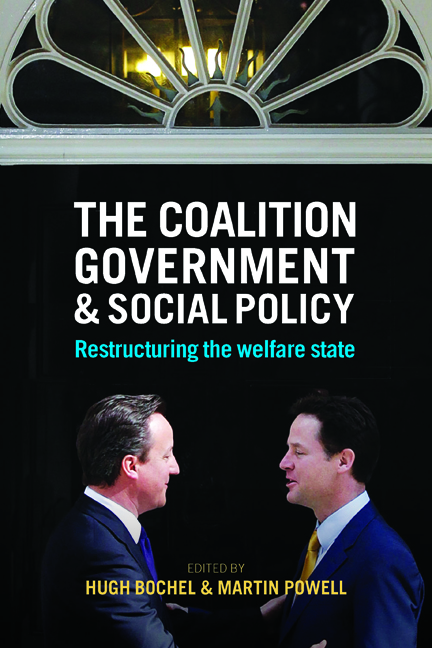Book contents
- Frontmatter
- Contents
- Notes on contributors
- One The transformation of the welfare state? The Conservative–Liberal Democrat coalition government and social policy
- Two The coalition government, public spending and social policy
- Three The changing governance of social policy
- Four The coalition, social policy and public opinion
- Five Health policy and the coalition government
- Six The coalition government, the general election and the policy ratchet in education: a reflection on the ‘ghosts’ of policy past, present and yet to come
- Seven Coalition housing policy in England
- Eight Social security under the coalition and Conservatives: shredding the system for people of working age; privileging pensioners
- Nine Welfare and active labour market policies in the UK: the coalition government approach
- Ten ‘It ain’t what you do, it’s the way that you do it’: adult social care under the coalition
- Eleven Family policy: the Mods and Rockers
- Twelve One step forward, two steps back: children, young people and the Conservative–Liberal Democrat coalition
- Thirteen The coalition and criminal justice
- Fourteen Equalities: the impact of welfare reform and austerity by gender, disability and age
- Fifteen Social policy, the devolved administrations and the UK coalition government
- Sixteen Conclusions
- Index
Fifteen - Social policy, the devolved administrations and the UK coalition government
Published online by Cambridge University Press: 01 September 2022
- Frontmatter
- Contents
- Notes on contributors
- One The transformation of the welfare state? The Conservative–Liberal Democrat coalition government and social policy
- Two The coalition government, public spending and social policy
- Three The changing governance of social policy
- Four The coalition, social policy and public opinion
- Five Health policy and the coalition government
- Six The coalition government, the general election and the policy ratchet in education: a reflection on the ‘ghosts’ of policy past, present and yet to come
- Seven Coalition housing policy in England
- Eight Social security under the coalition and Conservatives: shredding the system for people of working age; privileging pensioners
- Nine Welfare and active labour market policies in the UK: the coalition government approach
- Ten ‘It ain’t what you do, it’s the way that you do it’: adult social care under the coalition
- Eleven Family policy: the Mods and Rockers
- Twelve One step forward, two steps back: children, young people and the Conservative–Liberal Democrat coalition
- Thirteen The coalition and criminal justice
- Fourteen Equalities: the impact of welfare reform and austerity by gender, disability and age
- Fifteen Social policy, the devolved administrations and the UK coalition government
- Sixteen Conclusions
- Index
Summary
Introduction
Since the establishment of devolution for Scotland, Wales and Northern Ireland in 1999, a major feature has been the prominence of social policy in terms of the nature of devolved powers and in terms of devolved expenditure (Chaney and Drakeford, 2004; Mooney et al, 2006; Birrell, 2009). This was again demonstrated in the various programmes for government published following the 2011 elections for the devolved assemblies and the Scottish Parliament. There was originally a degree of policy continuity from the previous administrations, produced by rather similar electoral outcomes. In Scotland, the Scottish National Party (SNP) moved from a position as a minority government to forming the government with a majority (Cairney, 2011). In Wales, a Labour–Plaid Cymru coalition changed to a Labour administration, but with only 50% of the Assembly members. Northern Ireland continued with its form of compulsory coalition or power-sharing, consisting of a four-party executive, later a five-party executive, although with two parties, the Democratic Unionists and Sinn Fein, in a dominant position. The establishment of a UK Conservative–Liberal Democratic coalition brought an incongruence to the party and ideological alignments between the UK and the devolved governments and the increased possibility of major policy divergence. Three other debates were to have an important influence on the development of social policy. First, there was a debate on the future of devolution under the coalition government: this was to mean that a settled direction for the future of devolved policies and the meaning of the union was not clear (Jeffery et al, 2010). Second, there was a debate on the enhancements and changes in devolved powers: in Scotland, the debate on the powers of a Scottish government related to the campaign for independence for Scotland and the referendum; a major debate also commenced in Wales on the extension of legislative powers; while completing the devolution of justice and policing and some other limited extensions dominated the Northern Ireland debate. Third, there was an extensive debate on the financial arrangements and increasing fiscal devolution and responsibilities.
Context for proposals and action on financial and constitutional powers
A number of contextual factors were important for the operation of devolution under the coalition government in relation to social policy.
- Type
- Chapter
- Information
- The Coalition Government and Social PolicyRestructuring the Welfare State, pp. 325 - 346Publisher: Bristol University PressPrint publication year: 2016



